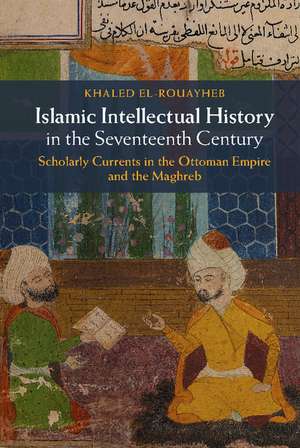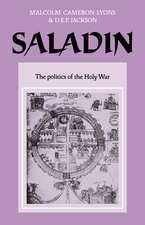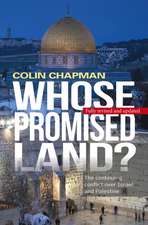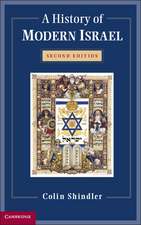Islamic Intellectual History in the Seventeenth Century: Scholarly Currents in the Ottoman Empire and the Maghreb
Autor Khaled El-Rouayheben Limba Engleză Hardback – 7 iul 2015
| Toate formatele și edițiile | Preț | Express |
|---|---|---|
| Paperback (1) | 276.61 lei 6-8 săpt. | |
| Cambridge University Press – 26 iul 2017 | 276.61 lei 6-8 săpt. | |
| Hardback (1) | 757.52 lei 6-8 săpt. | |
| Cambridge University Press – 7 iul 2015 | 757.52 lei 6-8 săpt. |
Preț: 757.52 lei
Preț vechi: 880.83 lei
-14% Nou
Puncte Express: 1136
Preț estimativ în valută:
144.95€ • 158.09$ • 122.23£
144.95€ • 158.09$ • 122.23£
Carte tipărită la comandă
Livrare economică 24 aprilie-08 mai
Preluare comenzi: 021 569.72.76
Specificații
ISBN-13: 9781107042964
ISBN-10: 1107042968
Pagini: 416
Ilustrații: 15 b/w illus. 3 maps
Dimensiuni: 152 x 231 x 28 mm
Greutate: 0.68 kg
Editura: Cambridge University Press
Colecția Cambridge University Press
Locul publicării:New York, United States
ISBN-10: 1107042968
Pagini: 416
Ilustrații: 15 b/w illus. 3 maps
Dimensiuni: 152 x 231 x 28 mm
Greutate: 0.68 kg
Editura: Cambridge University Press
Colecția Cambridge University Press
Locul publicării:New York, United States
Cuprins
Part I. 'The Path of the Kurdish and Persian Verifying Scholars': 1. Kurdish scholars and the reinvigoration of the rational sciences; 2. A discourse of method: the evolution of ādāb al-bahth; 3. The rise of 'deep reading'; Part II. 'Saving Servants from the Yoke of Imitation': 4. Maghrebi 'theologian-logicians' in Egypt and the Hejaz; 5. The condemnation of 'imitation' (taqlīd); 6. Al-Hasan al-Yūsī and two theological controversies in seventeenth-century Morocco; Part III. 'The Imams of Those Who Proclaim the Unity of Existence': 7. The spread of mystical monism; 8. Monist mystics and neo-Hanbalī traditionalism; 9. In defense of wahdat al-wujūd.
Recenzii
'A labor of admirable erudition, this book by Professor Khaled El-Rouayheb establishes a new standard for the intellectual history of Islam in general and for Ottoman intellectual history in particular. By focusing on the hitherto unexplored technical arguments of the textual traditions and by deftly placing them within the larger systems in which they developed, the author goes far beyond previous studies of Ottoman intellectual history that concerned themselves primarily with the social, cultural and legal locations of ideas. The history of ideas has finally taken center stage in Islamic studies as the guiding principle of intellectual history. This is pioneering work.' Asad Q. Ahmed, University of California, Berkeley
'A book like this would rank as a fine piece of scholarship in the intellectual history of any time and place. For the Islamic world of the sixteenth to eighteenth centuries, it transforms the field almost beyond recognition.' Michael Cook, Princeton University
'Khaled El-Rouayheb's Islamic Intellectual History in the Seventeenth Century is a most welcome contribution to an understudied subject and period, which sets out to challenge many preconceived notions of intellectual and scientific sclerosis. The author sets a perfect example as to how a period stigmatized by such negative perceptions should be investigated. Rather than seeking some Islamic 'Renaissance' or 'Enlightenment', he simply sets out to look at which significant works were produced during the period that contradict this general opinion, in order to understand the dynamics of reflection, transmission, inspiration and emulation in an interconnected Ottoman/Islamic world. The result is a meticulous and fascinating intellectual history enriched by textual and network analysis.' Edhem Eldem, Boğaziçi University
'In Islamic Intellectual History in the Seventeenth Century, Khaled El-Rouayheb probes taḥqīq or 'verification', whether based on dialectic, deep reading, or mystical illumination. In the process, he uncovers a vibrant intellectual world throughout the Ottoman Empire, North Africa and beyond. This is a groundbreaking work on the Islamic intellectual history of the early modern period.' Th. Emil Homerin, University of Rochester
'Khaled El-Rouayheb's groundbreaking study deals with Islamic intellectual history in the Ottoman Empire and North Africa during the seventeenth century - a century that was until now thought to be devoid of any intellectual achievements worth mentioning. … Both the geographical scope of this book and its analytical depth set an entirely new benchmark for any future study of Islamic intellectual thought in the so-called post-classical period.' Sabine Schmidtke, Institute for Advanced Study, School of Historical Studies
'Although El-Rouayheb views his book as being a humble step toward discovering the still largely unknown intellectual world of the Ottomans, his book may be regarded as a candidate for a 'cornerstone' work in the field of Ottoman intellectual history, for it sets an example for new studies that will be carried out with this kind of academic maturity.' Nazif Muhtaroðlu, Nazariyat
'[This book] is a reliable and accessible work of scholarship. El-Rouayheb's writing is quite analytical and lucid, and his research is astute and trustworthy … reading Islamic Intellectual History in the Seventeenth Century is a must for those studying Islamic philosophy and theology, Sufism, and intellectual history of the Ottoman Empire and the Maghreb. The book as a whole or in part is recommended as a textbook as well for courses in these areas.' Mustafa Yavuz, Dîvân: Journal of Interdisciplinary Studies
'El-Rouayheb's book, which is based on some of his previously published works, critically engages with the widely shared view among some contemporary Muslim and Western historians that the 17th century Muslim world was characterised by an acute education and intellectual stagnation and decline.' Abdullah Sahin, The Muslim World Book Review
'El-Rouayheb has produced a fascinating work that presents the early modern period as one of great intellectual vitality, with ideas and intellectual movements swirling from Morocco to Indonesia. He introduces us to a wide variety of figures, many of whom have been lost to history for all but the most determined of scholarly researchers.' John J. Curry, Journal of Ottoman Studies
'This is an important book. … one that scholars of the early modern period will no doubt read avidly. … In its nuances and detailed reading of the long seventeenth century, El-Rouayheb's book contains numerous insights into the significance and nature of both earlier and later periods and should be read by intellectual historians of Islam, regardless of the period in which they specialize.' Justin Stearns, Journal of the American Oriental Society
'A book like this would rank as a fine piece of scholarship in the intellectual history of any time and place. For the Islamic world of the sixteenth to eighteenth centuries, it transforms the field almost beyond recognition.' Michael Cook, Princeton University
'Khaled El-Rouayheb's Islamic Intellectual History in the Seventeenth Century is a most welcome contribution to an understudied subject and period, which sets out to challenge many preconceived notions of intellectual and scientific sclerosis. The author sets a perfect example as to how a period stigmatized by such negative perceptions should be investigated. Rather than seeking some Islamic 'Renaissance' or 'Enlightenment', he simply sets out to look at which significant works were produced during the period that contradict this general opinion, in order to understand the dynamics of reflection, transmission, inspiration and emulation in an interconnected Ottoman/Islamic world. The result is a meticulous and fascinating intellectual history enriched by textual and network analysis.' Edhem Eldem, Boğaziçi University
'In Islamic Intellectual History in the Seventeenth Century, Khaled El-Rouayheb probes taḥqīq or 'verification', whether based on dialectic, deep reading, or mystical illumination. In the process, he uncovers a vibrant intellectual world throughout the Ottoman Empire, North Africa and beyond. This is a groundbreaking work on the Islamic intellectual history of the early modern period.' Th. Emil Homerin, University of Rochester
'Khaled El-Rouayheb's groundbreaking study deals with Islamic intellectual history in the Ottoman Empire and North Africa during the seventeenth century - a century that was until now thought to be devoid of any intellectual achievements worth mentioning. … Both the geographical scope of this book and its analytical depth set an entirely new benchmark for any future study of Islamic intellectual thought in the so-called post-classical period.' Sabine Schmidtke, Institute for Advanced Study, School of Historical Studies
'Although El-Rouayheb views his book as being a humble step toward discovering the still largely unknown intellectual world of the Ottomans, his book may be regarded as a candidate for a 'cornerstone' work in the field of Ottoman intellectual history, for it sets an example for new studies that will be carried out with this kind of academic maturity.' Nazif Muhtaroðlu, Nazariyat
'[This book] is a reliable and accessible work of scholarship. El-Rouayheb's writing is quite analytical and lucid, and his research is astute and trustworthy … reading Islamic Intellectual History in the Seventeenth Century is a must for those studying Islamic philosophy and theology, Sufism, and intellectual history of the Ottoman Empire and the Maghreb. The book as a whole or in part is recommended as a textbook as well for courses in these areas.' Mustafa Yavuz, Dîvân: Journal of Interdisciplinary Studies
'El-Rouayheb's book, which is based on some of his previously published works, critically engages with the widely shared view among some contemporary Muslim and Western historians that the 17th century Muslim world was characterised by an acute education and intellectual stagnation and decline.' Abdullah Sahin, The Muslim World Book Review
'El-Rouayheb has produced a fascinating work that presents the early modern period as one of great intellectual vitality, with ideas and intellectual movements swirling from Morocco to Indonesia. He introduces us to a wide variety of figures, many of whom have been lost to history for all but the most determined of scholarly researchers.' John J. Curry, Journal of Ottoman Studies
'This is an important book. … one that scholars of the early modern period will no doubt read avidly. … In its nuances and detailed reading of the long seventeenth century, El-Rouayheb's book contains numerous insights into the significance and nature of both earlier and later periods and should be read by intellectual historians of Islam, regardless of the period in which they specialize.' Justin Stearns, Journal of the American Oriental Society
Notă biografică
Descriere
This book investigates the intellectual currents among Ottoman and North African scholars of the early modern period.












